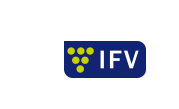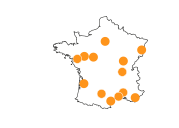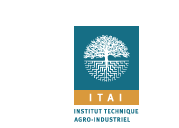IFV
Institut français de la vigne et du vin
Managing director
Headquarters
Domaine de l’Espiguette
30240 Le Grau-du-Roi
Tél. : 04 66 80 00 20
www.vignevin.com
direction@vignevin.com
Sectors
Wine-growing production (wines, brandies), vine nurseries (vine plants).
Skills
Ampelography, detection of viruses and phytoplasma in vines, molecular and genetic analysis, multiplication and diffusion of plant material, effluents and environment, wine-growing landscapes, wine-growing soils and areas, agronomy and vine-training, precision viticulture and MIS (Management Information System/Geographical Information System), vine phytosanitary protection, wine-growing equipment and spraying, vinification, sustainable œnology, wine-growing equipment and new technologies, flavours, yeast microbiology and alcoholic fermentation, bacterial microbiology and malo-lactic fermentation, hygiene and microbiology, residues and contaminants, and quality and safety.
Services
Consultancy and technical assistance
for companies
Thanks to its regional presence in production areas, the IFV benefits from specific skills for each subject of study. Thanks to its infrastructure and equipment, the IFV also responds to the various expectations of its partners on several themes: vineyard protection, wine-growing agronomy, wine-growing machinery, innovation in œnology, microbiological and fine analysis, environment and Bilan Carbone®.
Some examples of services
Acquisition of data required for the demand for approval of new molecules and evaluation of new formulations: each year, several hectares of diverse vine varieties are reserved for experimentation in vineyard protection and wine-growing agronomy.
Evaluation of the performance of wine-growing equipment and supplies: the skills of engineers and the ultra-modern equipment of the test wine warehouses enable specific studies for designing and testing innovations in products or equipment.
Fine analysis specific to R&D requirements
IFV laboratories are equipped with the latest technologies (aromatic composition of wines, microbiology of musts and wines, molecular biology, etc.).
Health and genetic analyses of vine plants (verification of the genetic identity and health status of vine plants).
General or specific training on the IFV's research themes.
Accreditations
Food technology institute (ITAI).
Farm technology institute (ITA).
Good experimental practices (GEPs) (some test sites, some storage and phytosanitary products preparation sites).
Cofrac n°1-1470: Plant material national knowledge cluster laboratory for detection of vine viruses by Elisa tests and for screening of phytoplasma diseases: “flavescence dorée and bois noir” (black wood disease).
Expertises
The International Organisation of Vine and Wine (OIV), Anses, INAO, Afaq, DGCCRF, DGDDI, FranceAgrimer, regional councils, Inra (scientific and technical council and scientific use council), Efsa and Institut des hautes études de la vigne et du vin (Institute for Further Studies in Wines and Vines).
Equipments
Three wine-growing testing estates.
Wine-growing test plots (study of cryptogamic diseases, rainwater run-off collectors for the study of transfers of phytosanitary products).
Technical halls dedicated to the study of the purification of wine-growing effluents, one laboratory dedicated to the study of sprayer prototypes, three laboratories dedicated to vinification, in Nîmes, Nantes and Gaillac, enabling œnological equipment tests.
The majority of sites are equipped with test wine warehouses enabling mini-vinification to be carried out: this miniaturized oenological equipment enables perfect small-scale reproduction of production conditions and guarantees standardisation of vinification operations in order to overcome any experimental bias.
Our laboratories enable full realisation of micro-vinifications and also enable the full set of conventional oenological analysis to be completed for the development of quality wines. Thus, we make use of visible and ultra-violet spectrophotometers, gas phase chromatography, ATP-metry, enzymatic sequencing, infra-red spectroscopy, etc.
Some of our laboratories are more specifically dedicated to particular scientific disciplines, including: mycology, entomology, microbiology, molecular biology and aromatic volatile compounds.
The majority of our sites are equipped with enotecas, enabling the preservation of tests over several years to verify the value of the practices studied on wine after aging.
Tasting rooms: The majority of our sites are equipped with tasting rooms adapted for blind tasting, enabling objective analysis of the results of our tests.
Contact
Other sites
Numbers of employees
Joint technological unit
Joint technological network
European projects
Scientific partnerships
With French teams
Inra (Colmar, Bordeaux, Montpellier), Irstea, Bordeaux Faculty of Oenology, Agroparistech, Montpellier Supagro, joint trade wine committees, Chambers of Agriculture, producers' unions, plant protection services, permanent selection technical committee, Institut coopératif du vin, INAO.
Specific Projects: University of Bordeaux I vine sciences, Énita de Bordeaux, BNIC, CRVI of Corse, Paris Natural History Museum, Technical Institute for Organic Farming (Itab), Acta Géno-Vigne RMT (management of genetic vine resources and preservation methods).
With international teams
Italian Association for Organic Farming (AIAB), University of Udine department of food sciences (Italy), Federal Association for Organic Farming - Écovin (Germany), Organic Farming Research Institute - Frick (Switzerland), Geisenheim research centre (Germany), Catholic University of the Sacred Heart (Italy), Vinidea (Italy).
Project examples
Selection of yeasts (technological and organoleptic value).
Selection and preservation of vine plants (maintaining the genetic diversity of vines).
Modelling of fungal diseases (recommendations enabling the rationalization of vine phytosanitary protection).
Development of internationally-recognised analytical methods (contributions to the OIV International Oenological Codex).






